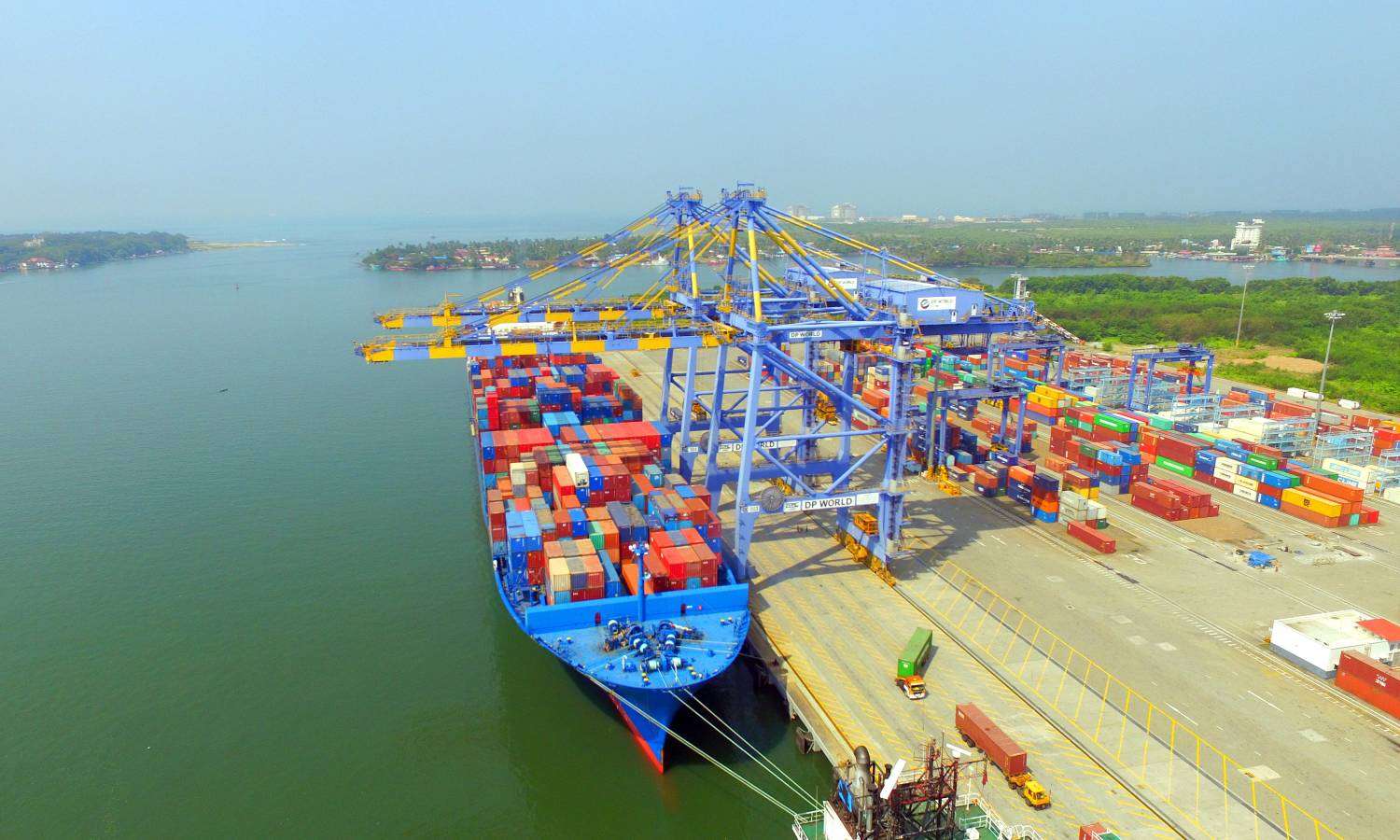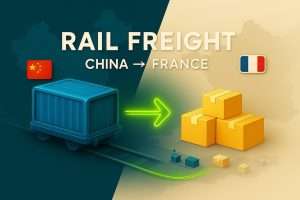When you think about shipping goods from China to South India, Cochin Port (also known as Cochin Port Trust) should be a top choice. Its strategic location and advanced facilities make it a crucial node for India’s import network, particularly for businesses targeting southern markets.
This guide breaks down everything you need to know about sea freight to Cochin, from popular shipping routes to customs clearance, port logistics, and tips to streamline your operations.
Why Cochin Port is a Strategic Gateway
Cochin Port is not just another seaport—it’s a strategic hub for South Indian imports. Here’s why it matters:
1. Strategic Location
Cochin Port is situated on the southwest coast of India in Kerala, giving it direct access to major international sea routes. This makes it the first major port of call for ships arriving from the Middle East and Southeast Asia, including China.
Its proximity to South Indian industrial and commercial hubs like Bangalore, Coimbatore, Chennai, and Hyderabad ensures that goods can be transported quickly and cost-effectively to inland destinations.
2. State-of-the-Art Infrastructure
Cochin Port boasts world-class facilities to handle large-scale cargo operations. Some highlights include:
- International Container Transshipment Terminal (ICTT): Located at Vallarpadam Island, this terminal can handle 2.5 million TEUs (Twenty-foot Equivalent Units) annually, making it one of the largest transshipment hubs in India.
- Dedicated Warehousing and Storage Solutions: From temperature-controlled facilities to general storage, the port provides options to suit various types of cargo.
- Multimodal Connectivity: Cochin is connected via road, rail, and inland waterways, enabling seamless movement of goods to major industrial areas.
3. Increasing Role in India-China Trade
Cochin Port is gaining prominence in India-China trade due to its ability to handle diverse cargo efficiently. With a 31% year-on-year increase in container traffic (2023), the port has demonstrated its capability to support growing trade volumes between the two nations.
Popular Shipping Routes from China to Cochin
Shipping routes are the backbone of global trade, and choosing the right route can significantly impact transit times, costs, and overall efficiency.
Key Ports in China
China’s massive export network is supported by its top-tier ports, many of which directly connect to Cochin.
- Shanghai Port: The busiest port globally, it handles bulk shipments like electronics, machinery, and industrial goods.
- Ningbo Port: Known for its high efficiency, Ningbo is a preferred port for exporting textiles, furniture, and consumer goods.
- Shenzhen (Yantian) Port: Ideal for tech and electronics shipments. It’s one of China’s most advanced ports.
- Qingdao Port: A hub for chemicals, rubber, and industrial components.
- Guangzhou Port: Focused on light manufacturing goods, including apparel and household items.
Typical Transit Times
Transit times depend on the shipping route and the method chosen (FCL vs. LCL). Below is a table showcasing approximate transit times for sea freight from China to Cochin:
| Port of Origin | Transit Time to Cochin |
|---|---|
| Shanghai | 16–20 days |
| Ningbo | 18–22 days |
| Shenzhen | 15–19 days |
| Qingdao | 20–25 days |
| Guangzhou | 17–21 days |
Factors Influencing Route Selection
The route you choose depends on several factors:
- Cost: Ports like Shenzhen and Ningbo often offer competitive rates for containerized shipping.
- Transit Time: For faster delivery, prioritize routes originating from southern ports like Shenzhen or Guangzhou.
- Cargo Type: Heavy machinery and bulk goods often ship from northern ports like Qingdao, while electronics are commonly exported from Shenzhen.
Why Sea Freight is the Best Option for Cochin
Sea freight dominates shipping from China to Cochin for its cost-effectiveness and flexibility. Here’s why businesses prefer it:
1. Lower Costs
Sea freight is significantly cheaper than air freight, especially for bulk shipments. For example:
- Shipping a 20GP container to Cochin costs around $800–$1,200.
- Air freight for the same weight would cost 5–8 times more, making it impractical for large shipments.
2. Flexible Shipment Sizes
Whether you’re shipping a full container load (FCL) or consolidating with others via less-than-container load (LCL), sea freight offers solutions tailored to your business needs.
3. Eco-Friendly
Compared to air freight, shipping via sea has a lower carbon footprint, making it the preferred choice for companies with sustainability goals.
Container Types Used for Cochin Port
| Container Type | Capacity | Ideal For |
|---|---|---|
| 20GP | ~28 cubic meters | Compact but heavy cargo. |
| 40GP | ~57 cubic meters | Large shipments (e.g., machinery, electronics). |
| 40HC | ~68 cubic meters | Bulky goods (e.g., textiles, furniture). |
Each container type is suited for specific cargo requirements, so it’s essential to choose based on weight, volume, and cargo nature.
Customs Clearance at Cochin Port
Navigating customs clearance can be a challenging process, but it’s an essential step when shipping to Cochin Port. With the right preparation and documentation, you can ensure a smooth and hassle-free experience.
1. Key Documentation Required
Here’s a list of the essential documents needed for customs clearance:
- Bill of Lading (BOL): This document acts as a contract between the shipper and the carrier, detailing the goods being transported.
- Commercial Invoice: This serves as proof of sale between the importer and the exporter, including details about the cargo, pricing, and terms of sale.
- Packing List: A detailed list of the items in the shipment, including dimensions and weight.
- Importer Exporter Code (IEC): A unique code issued by Indian customs that every importer must have.
- HS Code Classification: Accurate classification of goods under the Harmonized System to avoid miscalculated duties or penalties.
2. Customs Process Overview
The customs clearance process at Cochin Port typically involves the following steps:
- Submission of Documents: All relevant documentation is submitted to customs electronically via the ICEGATE portal.
- Assessment of Duties: Customs officers assess the applicable duties and taxes based on the cargo’s value and HS code.
- Inspection and Examination: Physical inspection may be conducted to verify the cargo against the documents.
- Duty Payment and Clearance: Import duties are paid, and once approved, the shipment is cleared for release.
3. Challenges Importers Face
Despite being straightforward, customs clearance can present several challenges:
- Delayed Documentation: Missing or incorrect paperwork can lead to significant delays.
- Improper HS Code Classification: Misclassification can result in fines or additional duties.
- Port Congestion: During peak seasons, clearance times can increase due to backlog.
4. Tips for Smooth Clearance
To ensure your goods are cleared efficiently, follow these best practices:
- Hire an Experienced Customs Broker: Professionals familiar with Cochin Port can handle documentation and inspections effectively.
- Submit Documents Early: Avoid delays by ensuring your paperwork is ready before your shipment arrives.
- Double-Check HS Codes: Work with your supplier to classify goods accurately under the Harmonized System.
Port Congestion and Handling at Cochin
Like any major port, Cochin Port experiences congestion, especially during peak trade seasons. However, proactive measures can help you minimize delays.
1. Common Causes of Port Congestion
- Seasonal Surges: Increased shipments during festivals like Diwali and Christmas lead to higher-than-usual traffic.
- Limited Docking Space: Despite modern facilities, the port occasionally struggles with berth availability for large vessels.
- Document Delays: Inefficient document submissions contribute to backlogs.
2. Average Dwell Times
Dwell time refers to how long cargo spends at the port before it’s cleared. At Cochin Port:
- Average Dwell Time for Imports: 2–3 days.
- During Peak Season: 4–6 days.
3. How to Mitigate Congestion
- Use Off-Dock Container Freight Stations (CFS): Move your containers to nearby CFS facilities for faster processing and reduced port pressure.
- Plan Shipments in Off-Peak Seasons: Avoid high-volume periods to ensure quicker handling.
- Submit Documents Early: Complete customs paperwork before your vessel arrives to minimize delays.
Logistics After Arrival at Cochin Port
Once your goods clear customs, the next step is getting them to their final destination. Cochin Port is well-connected to South India’s major industrial hubs through a robust network of road, rail, and waterways.
1. Inland Connectivity Options
- Road: Kerala’s road network connects Cochin to major cities like Coimbatore, Bangalore, and Chennai.
- Rail: Rail transport is efficient for moving large volumes of goods to distant locations.
- Multimodal Transport: Combining road and rail can reduce costs and transit times.
2. Key Industrial Hubs Served
Cochin Port plays a crucial role in supporting industries across South India:
- Coimbatore: Known for textiles and machinery.
- Bangalore: A hub for electronics, IT, and heavy machinery.
- Chennai: Specializes in automotive and industrial components.
3. Warehousing Solutions
Warehousing is a critical part of logistics after arrival. Near Cochin Port, you’ll find:
- General Warehousing: Ideal for consumer goods, textiles, and appliances.
- Temperature-Controlled Storage: For perishables and pharmaceuticals.
- Bonded Warehousing: Enables deferred payment of customs duties.
Choosing the Right Freight Forwarder for Cochin
Selecting a freight forwarder who understands the nuances of shipping to Cochin Port is one of the most important steps in ensuring a smooth logistics process. With the port’s unique characteristics and South India’s trade demands, partnering with the right expert can make or break your supply chain.
1. Why a Freight Forwarder is Crucial
A freight forwarder acts as the backbone of your shipping operations, managing everything from documentation to delivery. Here’s why you need one:
- Streamlined Customs Processes: They handle the complex paperwork and navigate customs efficiently.
- Expertise in Port Operations: Local knowledge of Cochin Port’s infrastructure and regulations ensures faster clearance.
- End-to-End Solutions: From port handling to inland delivery, a freight forwarder ensures seamless coordination.
2. Services Offered by Freight Forwarders for Cochin
When shipping to Cochin, look for a forwarder who provides these essential services:
- Customs Brokerage: Expertise in Cochin-specific requirements like IEC codes and HS classifications.
- Port Handling: Efficient container management at the ICTT and other port facilities.
- Inland Transport: Arranging road, rail, or multimodal transport to industrial hubs.
- Cargo Tracking: Real-time updates on your shipment’s status to minimize uncertainty.
3. Tips for Selecting the Best Forwarder
To choose the right freight partner:
- Look for Local Expertise: A forwarder familiar with Cochin’s customs and port operations is invaluable.
- Check Their Network: Ensure they have established connections with Chinese ports like Shanghai, Ningbo, and Shenzhen.
- Review Their Track Record: Client reviews and case studies can reveal how they’ve handled similar shipments.
- Ask About Contingency Plans: Ensure they have strategies to handle port congestion or customs delays.
Common Commodities Shipped from China to Cochin
Cochin Port is a hub for a diverse range of goods imported from China. Here are the most frequently shipped items:
1. Electronics and Appliances
From consumer electronics to industrial devices, China’s electronics exports form a major part of Cochin’s import traffic. Popular items include:
- Smartphones and accessories.
- Household appliances like air conditioners and refrigerators.
- Industrial components like circuit boards and transformers.
2. Machinery and Equipment
South India’s manufacturing sector relies heavily on machinery imports from China, including:
- Textile machinery for Coimbatore’s thriving industry.
- Heavy machinery for construction projects in Kerala and Karnataka.
- Agricultural equipment for South Indian farming hubs.
3. Textiles and Garments
Cochin Port handles large volumes of textiles and ready-made garments, which are in high demand across South India. Common imports include:
- Fabrics for local garment manufacturing.
- Finished clothing for retail markets.
4. Chemicals and Raw Materials
Industries in Bangalore and Chennai rely on imports of:
- Industrial chemicals for production.
- Rubber and plastic materials for automotive and consumer goods manufacturing.
Tips for Efficient Shipping to Cochin
Efficiency in shipping comes down to careful planning and smart decision-making. Here’s how to optimize your shipping process to Cochin Port:
1. Select the Right Port of Origin in China
Each Chinese port specializes in different types of goods. Match your shipment to the most suitable port:
- Use Shanghai or Shenzhen for electronics and machinery.
- Opt for Ningbo for textiles and consumer goods.
- Ship from Qingdao for chemicals and industrial components.
2. Plan Around Peak Seasons
To avoid delays and inflated costs:
- Ship during off-peak seasons (January–March, August–October).
- Avoid high-demand periods like pre-Diwali months (September–October) when port congestion spikes.
3. Work with Trusted Partners
From freight forwarders to customs brokers, partnering with experienced professionals ensures that:
- Your documentation is error-free.
- Delays are minimized during customs clearance.
- You save on unnecessary costs related to misclassification or penalties.
4. Use Accurate Documentation
Ensure every document is accurate and complete. Common areas to double-check:
- The HS code aligns with the goods being shipped.
- The Commercial Invoice matches the shipment’s declared value.
- Any required certifications (e.g., for hazardous goods) are included.
FAQ: Shipping from China to Cochin Port
How long does it take to ship goods from China to Cochin?
The transit time depends on the port of origin in China and the shipping method used. Typically, sea freight from major Chinese ports like Shanghai, Ningbo, or Shenzhen to Cochin takes between 15 to 25 days. Factors like the route, weather conditions, and port congestion can influence these timelines.
What are the most common goods shipped from China to Cochin?
Electronics, machinery, textiles, garments, chemicals, and industrial raw materials are among the most frequently shipped goods. South India’s industries and retail markets heavily rely on these imports to meet their manufacturing and consumer demands.
Is sea freight the best option for shipping to Cochin Port?
Sea freight is the most cost-effective option for shipping large or heavy goods to Cochin. It allows for bulk shipments at a fraction of the cost of air freight, making it the preferred choice for most businesses. While it’s slower than air freight, its affordability and capacity make it ideal for high-volume imports.
What types of containers are used for shipping to Cochin?
The most common containers used are 20GP, 40GP, and 40HC. The choice of container depends on the size, weight, and type of cargo. For heavy but compact goods, 20GP is often used, while 40GP and 40HC are suitable for larger or lighter shipments.
What documents are required for customs clearance at Cochin Port?
The essential documents include the Bill of Lading, Commercial Invoice, Packing List, and Importer Exporter Code (IEC). Proper HS code classification is also crucial for determining the correct duties and taxes. Ensuring that all documentation is accurate and complete is vital to avoid delays.
How can I avoid delays during customs clearance at Cochin Port?
Working with an experienced customs broker can help streamline the process. Submitting all required documentation in advance and ensuring the accuracy of the details provided will significantly reduce the chances of delays. Early planning is essential, especially during peak seasons.
Is Cochin Port connected to major industrial hubs in South India?
Yes, Cochin Port has excellent connectivity to industrial hubs like Coimbatore, Bangalore, and Chennai. Goods can be transported efficiently via road, rail, and multimodal transport options, making Cochin a vital gateway for South India’s supply chain.
What should I do to minimize the impact of port congestion at Cochin?
To mitigate delays caused by port congestion, consider using off-dock Container Freight Stations (CFS) to speed up cargo handling. Planning shipments during off-peak seasons and submitting documentation early can also help reduce wait times and improve efficiency.
How much does it cost to ship goods from China to Cochin?
The cost of shipping depends on the type of cargo, container size, and market conditions. On average, a 20GP container costs between $800 and $1,200 to ship to Cochin, while a 40GP container ranges from $1,200 to $1,800. These prices fluctuate based on demand and fuel surcharges.
Why is Cochin Port a preferred destination for imports from China?
Cochin Port’s strategic location, world-class infrastructure, and proximity to South India’s major markets make it a preferred choice for importers. Its facilities, including the International Container Transshipment Terminal (ICTT), enable efficient handling of goods, while its connectivity ensures smooth inland transportation.
Cochin Port is not just a gateway to South India—it’s a vital hub that can transform your import operations if approached strategically. By understanding the shipping routes, customs processes, and logistics network, you can streamline your supply chain and maximize profitability.
Final Tips:
- Plan Ahead: Schedule shipments early and avoid peak seasons.
- Choose the Right Partners: Work with a freight forwarder who understands Cochin’s unique logistics.
- Stay Informed: Keep track of port updates and regulatory changes to stay ahead of potential challenges.
Ready to optimize your shipping from China to Cochin Port? Contact an experienced freight expert today to simplify your operations and reduce costs.












